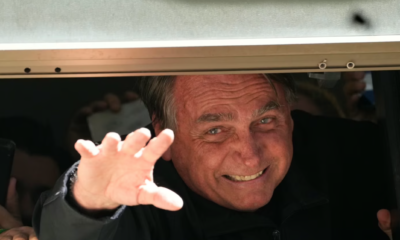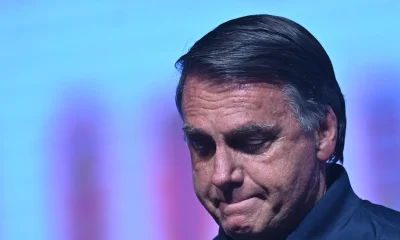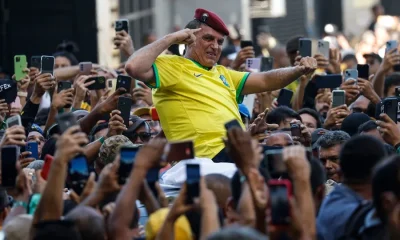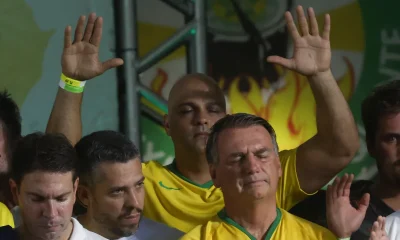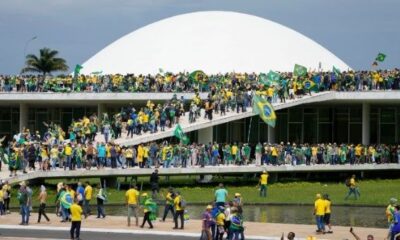International
Brazil roadblocks dwindle as Bolsonaro starts handover
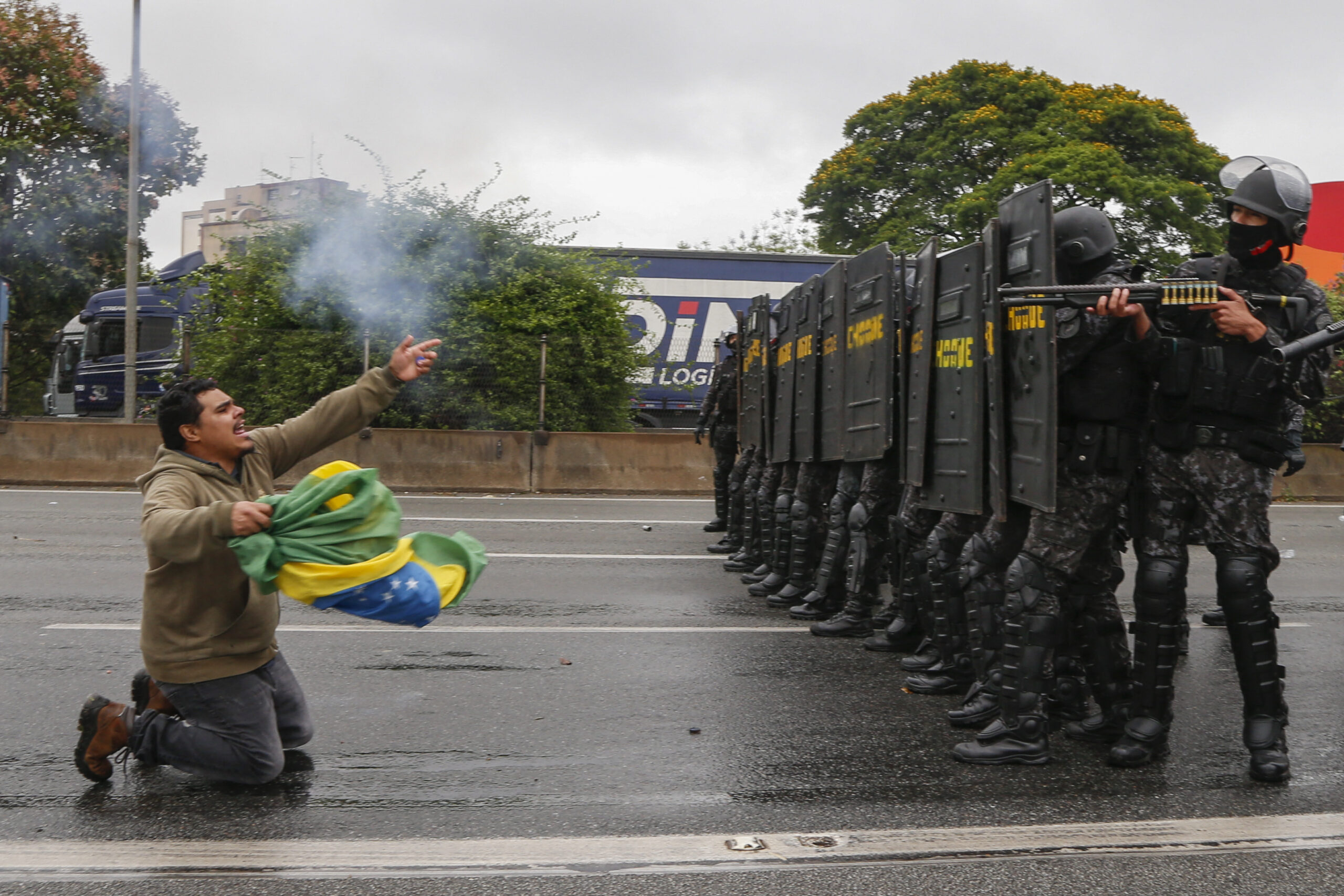
| By AFP |
Brazilian police said Friday they have nearly finished clearing hundreds of roadblocks by supporters of far-right President Jair Bolsonaro, who have been protesting since his election loss to veteran leftist Luiz Inacio Lula da Silva.
Just 15 partial roadblocks remain nationwide, said federal highway police, adding they had broken up another 954 since Sunday’s divisive presidential runoff election.
Bolsonaro supporters reacted furiously to Lula’s narrow victory, blocking highways with cars, trucks, and tractors and camping out at army bases to demand a military intervention.
The blockades had threatened to cause havoc in Latin America’s biggest economy but have diminished since Bolsonaro urged supporters Wednesday to “unblock the roads.”
Ex-army captain Bolsonaro remained silent for nearly two days after the election, raising fears he would try to cling to power with the backing of hardline supporters.
But after a series of key allies acknowledged the result, the incumbent said Tuesday he would respect the constitution and authorized the start of the transition process for Lula’s inauguration on January 1.
However, Bolsonaro has still not explicitly recognized the result or congratulated Lula.
The outgoing president on Thursday met briefly with vice president-elect Geraldo Alckmin, who is heading Lula’s transition team.
Alckmin said the meeting had been “positive,” and that Bolsonaro had promised “all information and assistance needed for a smooth transition.”
Pro-Bolsonaro protests had dwindled Friday morning outside military bases in various cities.
Around 100 people remained outside a barracks in Brasilia, an AFP photographer said. In Sao Paulo, a handful of protesters remained, calling for “divine and then military intervention.”
In Rio de Janeiro, demonstrators had dispersed.
The remaining roadblocks affect just five of Brazil’s 27 states, police said.
The National Confederation of Industry had warned Tuesday that there was an “imminent risk of shortages” if highways were not quickly cleared.
Although Bolsonaro urged supporters to lift their roadblocks, he also encouraged “legitimate demonstrations,” raising fears Brazil may still face turbulent times until Lula is sworn in, and beyond.
Ex-metalworker Lula, 77, who led Brazil from 2003 to 2010, won an unprecedented third term with 50.9 percent of the vote, to 49.1 percent for Bolsonaro — the closest presidential election in the country’s modern history.
International
New York Announces First 2,000 Seats in Universal 2-K Program
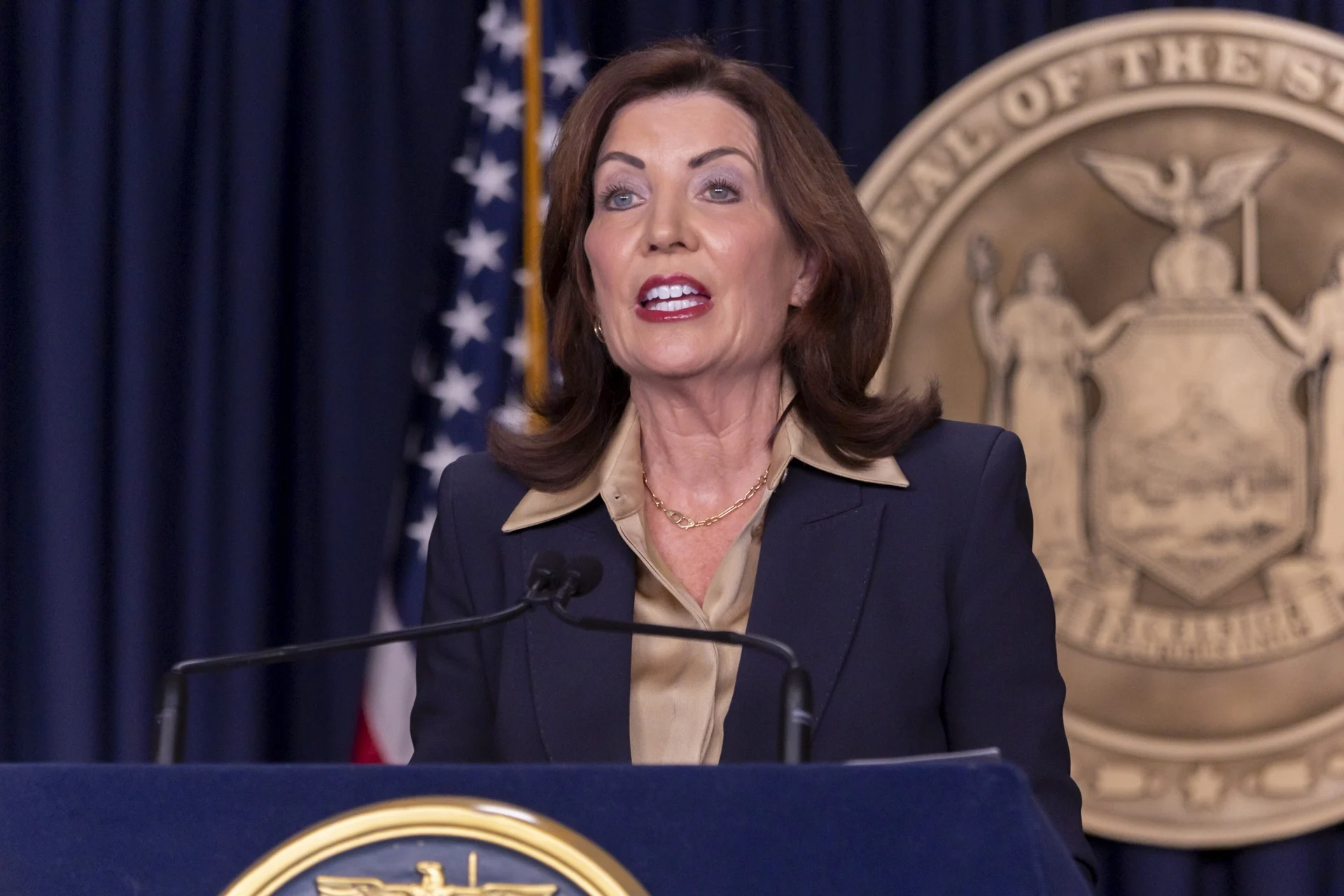
The Governor of New York, Kathy Hochul, and New York City Mayor Zohran Mamdani took another step today in their universal early education agenda by announcing the communities that will have access to the first 2,000 seats in the new 2-K program this fall — an initiative backed by a $73 million investment.
The funding is part of the $1.2 billion package previously unveiled by Hochul to strengthen child care and early childhood education across the city, one of the key campaign promises of the now Social Democratic mayor.
At the time of the announcement, the governor also outlined additional funds to reinforce the existing 3-K early education infrastructure, a program launched under former Mayor Bill de Blasio (2014–2021).
When the 2-K initiative was introduced in January, Mayor Mamdani explained that its first phase would offer 2,000 seats, with the goal of eventually expanding into a universal program — a commitment supported by the governor.
State investment in child care and preschool services is expected to increase to $4.5 billion by fiscal year 2027.
Among the first communities set to benefit from the 2,000 seats are Upper Manhattan and Inwood — areas with large Dominican populations — as well as Fordham and Kingsbridge in the Bronx, a borough with a Latino majority.
In East Brooklyn, Canarsie, Brownsville, and Ocean Hill will also be included. Meanwhile, Ozone Park and the Rockaways are among the neighborhoods that will see the rollout of the 2-K program.
International
Warner Bros. Developing First ‘Game of Thrones’ Movie With ‘Andor’ Writer
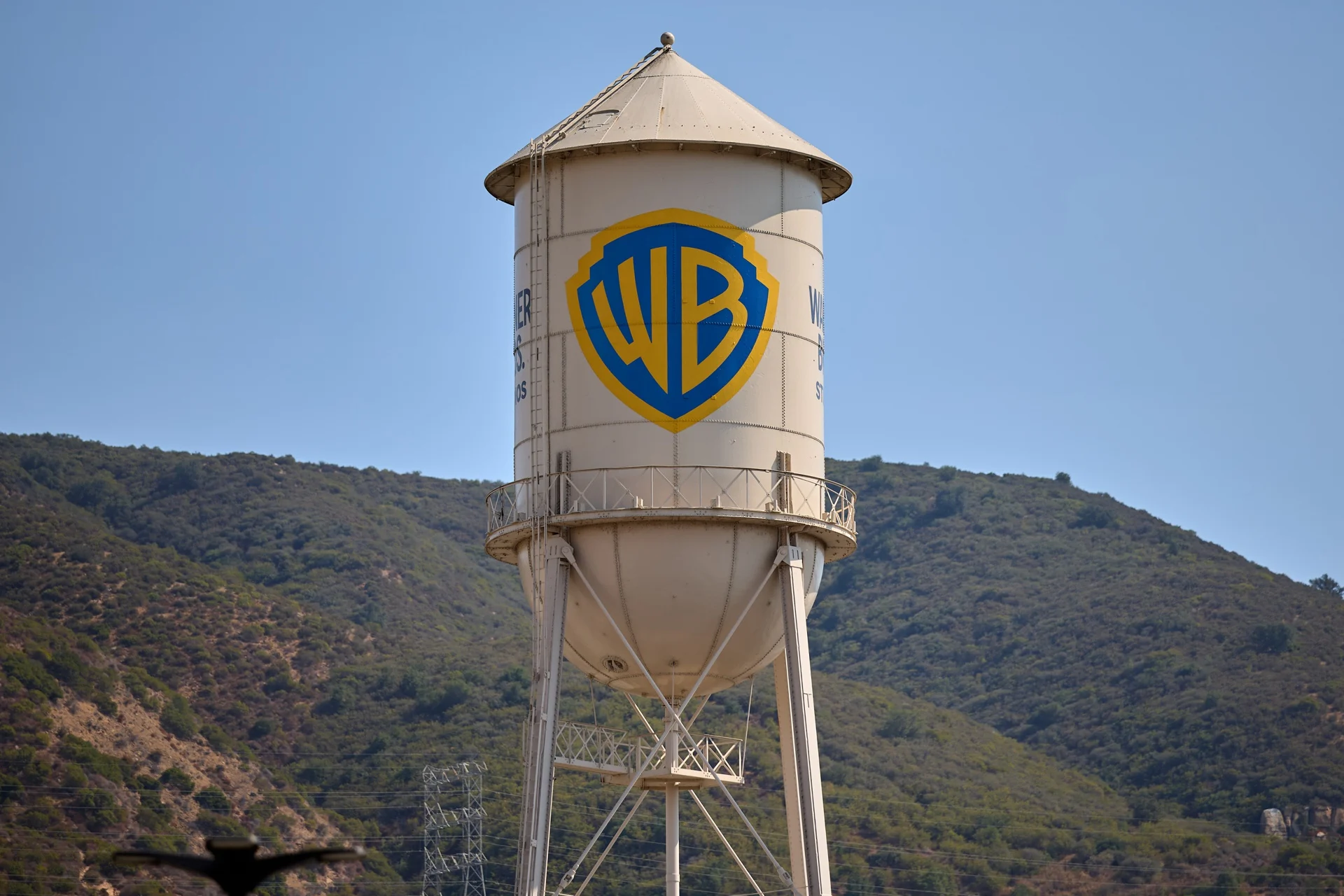
Warner Bros. is developing the first feature film based on the hit saga Game of Thrones, with Beau Willimon — screenwriter of Andor — attached to direct, according to a report published Tuesday by Page Six.
The project, currently in early development, will focus on the conquest of King Aegon I Targaryen. A separate television adaptation centered on the same historical storyline within the franchise is also in early stages at HBO.
However, the outlet noted that it remains unclear whether the film will move forward following the recent acquisition of Warner Bros. Discovery by Paramount Skydance.
If the merger is finalized, the movie could potentially be shelved, although that scenario appears unlikely given that the Game of Thrones franchise remains one of HBO’s most valuable and beloved properties.
After six seasons adapting the work of George R. R. Martin, the platform expanded the universe with House of the Dragon, a prequel series set 200 years before the events of Game of Thrones that explores the history of House Targaryen.
International
Spain’s Prime Minister to Address Nation Amid Trump’s Trade Threats

The Prime Minister of Spain, Pedro Sánchez, will deliver an institutional address this Wednesday at the Moncloa Palace regarding the escalating situation in the Middle East and recent threats directed at Spain by U.S. President Donald Trump.
The Spanish government announced that Sánchez will make a statement at 9:00 a.m. local time to outline his position on the latest developments following the U.S. and Israeli attacks on Iran.
Sánchez is expected to reiterate Spain’s reasons for opposing the use of U.S. military bases on Spanish soil in the operation—an action he has already described as being outside international law—while also expressing criticism of the Iranian regime.
Government sources indicated that the address had been planned prior to Trump’s remarks criticizing Spain’s stance. However, following those comments, Sánchez is now also expected to respond directly to the U.S. president’s statements.
Trump has threatened to “cut all trade with Spain” and said he wants “nothing to do” with the country after Madrid refused to authorize the use of the Morón and Rota military bases in southern Spain for operations against Tehran.
The U.S. president also labeled Spain “a terrible NATO partner” and warned that “no one” would tell him he could not use the facilities.
In response, the Spanish government stated that Spain fulfills its commitments to NATO and European defense. It also warned Trump that any review of bilateral trade relations must respect international law and the agreements in place between the European Union and the United States.
-

 International3 days ago
International3 days agoIran Reports 201 Dead, 747 Injured After U.S. and Israeli Strikes
-

 International3 days ago
International3 days agoPope Leo XIV Urges End to ‘Spiral of Violence’ in Middle East
-

 International2 days ago
International2 days agoBrazil’s Supreme Court Rejects Bolsonaro’s Bid for House Arrest
-

 International4 days ago
International4 days agoSecurity Council to Hold Emergency Meeting on Middle East Crisis
-

 International5 days ago
International5 days agoTrump Floats “Friendly Takeover” of Cuba Amid Rising Tensions
-

 Sin categoría4 days ago
Sin categoría4 days agoTrump: ‘We Think It’s True’ Amid Claims Iran’s Supreme Leader Was Killed
-

 International5 days ago
International5 days agoArgentina’s Senate Reviews Milei-Backed Labor Overhaul
-

 International2 days ago
International2 days agoAnti-ICE Billboard Campaign Targets Immigration Spending in 31 U.S. Cities
-

 International2 days ago
International2 days agoTrump Warns of ‘Major Wave’ of Attacks as Iran Conflict Escalates
-

 International2 days ago
International2 days agoMexico Calls for Immediate Probe After National Dies in ICE Custody
-

 International20 hours ago
International20 hours agoSpain’s Prime Minister to Address Nation Amid Trump’s Trade Threats
-

 International20 hours ago
International20 hours agoNew York Announces First 2,000 Seats in Universal 2-K Program
-

 Central America2 days ago
Central America2 days agoPanama Canal Monitoring Trade as Middle East Conflict Disrupts Shipping
-

 International2 days ago
International2 days agoBolivia Orders Three Investigations Into Deadly Military Plane Crash
-

 Central America20 hours ago
Central America20 hours agoGuatemala’s Attorney General Fails in Bid for Top Court Seat Amid Corruption Allegations
-

 International20 hours ago
International20 hours agoWarner Bros. Developing First ‘Game of Thrones’ Movie With ‘Andor’ Writer































